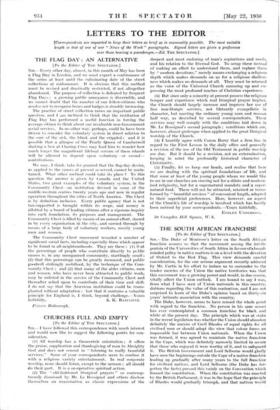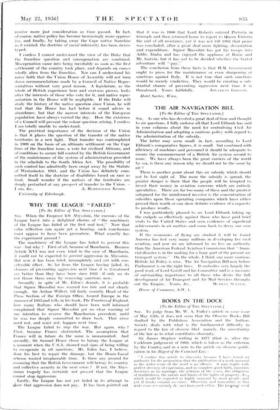THE SOUTH AFRICAN FRANCHISE
[To the Editor of THE SPECTATOR.]
Sin,—The Duke of Montrose's letter on the South African franchise assures us that the movement among the intelli- gentsia of the Universities of South Africa in favour of a broad- minded policy in native matters is on a level with the devotion of Oxford to the Red Flag. This view demands careful consideration, for the one serious argument recently adduced by Mr. Curtis in his effort to induce us to surrender to the tender mercies of the Union the native territories was that this movement was a growing power and would, in due course, vitally affect the Union outlook. I am bound to say I was, from what I have seen of Union nationals in this country, dubious regarding the value of this contention, and I am not surprised to learn of the Duke's opinion based on thirty-six years' intimate association with the country.
The Duke, however, seems to have missed the whole point with regard to the franchise. No person in his sane senses has ever contemplated a common franchise for black and white at the present day. The principle which was at stake in the recent legislation was whether the Union should abandon definitely the maxim of Cecil Rhodes of equal rights for all civilised men or should adopt the view that colour forms an impassable bar between Union nationals. When the Union was formed, it was agreed to maintain the native franchise in the Cape, which was definitely narrowly limited to secure that those who enjoyed it were worthy of it, and to safeguard it. The British Government and Lord Selborne would gladly have seen the beginnings outside the Cape of a native franchise leading up gradually after many years to the full franchise for civilised natives,' and Lord Selborne (the Duke has for- gotten the facts) pressed this vainly on the Convention which framed the.constitution. When the constitution was enacted by the British Parliament, it was in the hope that the principle of Rhodes would gradually triumph, and that natives would
receive more just consideration as time passed. In fact, of course, native policy has become increasingly more oppress- ive. and finally, by taking away the Cape native franchise as it existed, the doctrine of racial inferiority has been stereo- typed.
I confess I cannot understand the view of the Duke that the franchise question and miscegenation are combined. Miscegenation came into being inevitably. as soon as the first settlement of the country took place, and depends on causes wholly alien from the franchise. Nor can I understand his naive faith that the Union House of Assembly will not turn down recommendations made by a Council of Native Repre- sentatives without very good reason. A legislature, as the whole of British experience here and overseas proves, looks after the interests of those who vote for it, and native repre- sentation in the House will be negligible. If the Duke will study the history of the native question since Union, he will had that the House has had before it sound advice in abundance, but that the narrow interests of the European population have always carried the day. How the existence of a Council will prevent the colour question arising, I confess I am totally unable to understand.
The practical importance of the decision of the Union is that it places the question of the transfer of the native territories in a new light. That transfer was contemplated in 1909 on the basis of an ultimate settlement on the Cape lines of the franchise issue, a vote for civilised Africans, and of conditions to secure full control by the British Government of the maintenance of the system of administration provided in the schedule to the South Africa Act. The possibility of such control has admittedly been swept away by the Statute of Westminster, 1931, and the Union has definitely com- mitted itself to the doctrine of disabilities based on race as final. Small wonder if the natives of the territories are deeply perturbed at any prospect of transfer to the Union.-



















































 Previous page
Previous page